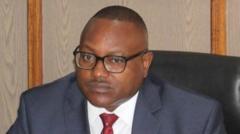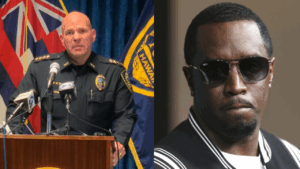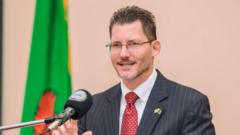With a decisive 56.6% victory over incumbent Vice-President Mahamudu Bawumia, Mahama returns to a nation grappling with a cost-of-living crisis and demands for government accountability, leaving him with a tough road ahead to meet public expectations.
Ghana's New President Faces High Expectations Amid Economic Challenges

Ghana's New President Faces High Expectations Amid Economic Challenges
Ghana's recent presidential election saw former President John Mahama reclaim power, igniting hopes for economic recovery and job creation among Ghanaians.
With the election victory, former President John Mahama, returning to power after a significant eight-year absence, confronts the earnest hopes of Ghanaians yearning for economic revitalization. Campaigning effectively against Vice-President Mahamudu Bawumia, Mahama's success marks a notable political shift, as he garnered 56.6% of votes against Bawumia’s 41.6%. Despite celebrating the victory, there are underlying concerns to address, particularly a disturbing decline in voter turnout compared to the previous election. Many constituents, disillusioned by the performance of Bawumia’s New Patriotic Party (NPP), opted to abstain rather than switch allegiances.
Voter sentiment is echoed in the words of Belinda Amuzu, a teacher from Mahama's stronghold in Tamale, expressing a collective demand for economic change and accountability from previous administrations. The crisis stemming from Ghana's economic downturn since 2022, resulting in soaring living costs, has put immense pressure on Mahama’s new government to deliver.
Economists assert that Mahama's administration will be tested by severe economic challenges; a credible leadership style, an efficient government, and a commitment to improving public services are deemed essential for the nation’s future. Mahama’s promise to reduce his cabinet from over 80 members to around 60 is seen as a step towards a leaner government, although some experts are calling for even greater cuts and merit-based appointments rather than those based on loyalty.
Crucially, Mahama has made job creation and a reduction of so-called "nuisance taxes" like the electronic levy on mobile transactions central to his platform. The gloomy specter of previous economic failures haunts him, especially given the widespread issues in energy supply during his last presidency, where he earned the moniker “Mr. Dumsor.”
Critics remain skeptical about the viability of Mahama's ambitious plans due to concerns about funding and the overall economic landscape's viability. He believes, however, that renegotiating the terms of Ghana’s $3 billion loan from the International Monetary Fund (IMF) could free up resources for critical social programs, addressing poverty affecting millions of Ghanaians.
On the cusp of leadership once more, Mahama must balance public sentiment against his previous administration's controversies, including alleged corruption with international defense contracts. He asserts a firm stance against corruption in his upcoming term, planning to ensure accountability within government ranks.
As Mahama prepares to take office next month, public expectations are exceptionally high. He acknowledges this reality in his victory speech, underscoring the urgent need to meet the hopes of the Ghanaian people: “Expectations of Ghanaians are very high, and we cannot afford to disappoint them." The path to recovery remains fraught with difficulty, but Mahama holds onto a vision of a promising future for Ghana.
Voter sentiment is echoed in the words of Belinda Amuzu, a teacher from Mahama's stronghold in Tamale, expressing a collective demand for economic change and accountability from previous administrations. The crisis stemming from Ghana's economic downturn since 2022, resulting in soaring living costs, has put immense pressure on Mahama’s new government to deliver.
Economists assert that Mahama's administration will be tested by severe economic challenges; a credible leadership style, an efficient government, and a commitment to improving public services are deemed essential for the nation’s future. Mahama’s promise to reduce his cabinet from over 80 members to around 60 is seen as a step towards a leaner government, although some experts are calling for even greater cuts and merit-based appointments rather than those based on loyalty.
Crucially, Mahama has made job creation and a reduction of so-called "nuisance taxes" like the electronic levy on mobile transactions central to his platform. The gloomy specter of previous economic failures haunts him, especially given the widespread issues in energy supply during his last presidency, where he earned the moniker “Mr. Dumsor.”
Critics remain skeptical about the viability of Mahama's ambitious plans due to concerns about funding and the overall economic landscape's viability. He believes, however, that renegotiating the terms of Ghana’s $3 billion loan from the International Monetary Fund (IMF) could free up resources for critical social programs, addressing poverty affecting millions of Ghanaians.
On the cusp of leadership once more, Mahama must balance public sentiment against his previous administration's controversies, including alleged corruption with international defense contracts. He asserts a firm stance against corruption in his upcoming term, planning to ensure accountability within government ranks.
As Mahama prepares to take office next month, public expectations are exceptionally high. He acknowledges this reality in his victory speech, underscoring the urgent need to meet the hopes of the Ghanaian people: “Expectations of Ghanaians are very high, and we cannot afford to disappoint them." The path to recovery remains fraught with difficulty, but Mahama holds onto a vision of a promising future for Ghana.






















